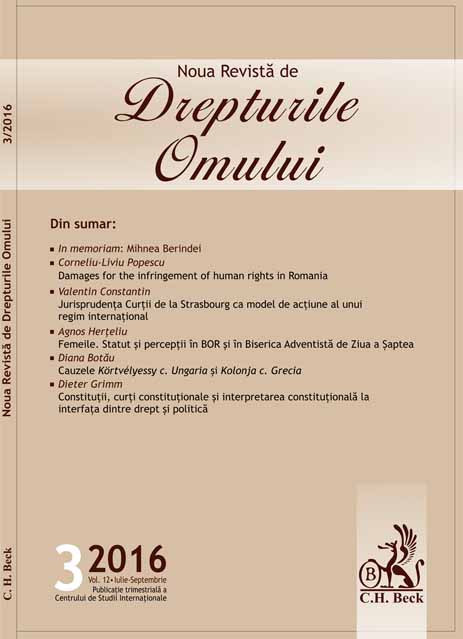Cauzele Körtvélyessy c. Ungaria şi Kolonja c. Grecia
The cases Körtvélyessy v. Ungaria and Kolonja v. Greece
Author(s): Diana BotăuSubject(s): Politics / Political Sciences, Social Sciences, Law, Constitution, Jurisprudence
Published by: Centrul de Studii Internationale
Keywords: private and family life; immigration; peaceful assembly; Freedom of assembly and association; Art. 8 of the Convention; Art. 11 of the Convention
Summary/Abstract: - Art. 11 of the Convention - "Freedom of assembly and association". The Court considers that the reason relied upon by the Government to ban peaceful assembly planned by the petitioner is not sufficient to be associated with an acute social need. Therefore, it was no demonstrated that the prohibition was necessary in a democratic society to achieve the objectives. Accordingly, the art. 11 of the European Convention on Human Rights had been violated. - Art. 8 of the Convention - "The right to respect for private and family life". The Court recalls that Article. 8 should not be interpreted as meaning that its provisions would require that the state general obligation is to respect the possibility of married couples to choose their country of residence and to allow family reunification in the territory of that country. Therefore, in a case aimed at both family life and immigration extent of the State's obligation to admit to its territory of persons residing close there varies depending on the particular situation of the persons concerned and the general interest. The Court concludes that, in this case, has not achieved the right balance, meaning that permanent prohibition to enter Greek territory, applied petitioner was not proportionate to the aims pursued. Therefore, a violation has occurred of the art. 8 of the European Convention on Human Rights.
Journal: Noua Revistă de Drepturile Omului
- Issue Year: 12/2016
- Issue No: 3
- Page Range: 81-90
- Page Count: 10
- Language: Romanian

